Book I, Chapter 15: The Slime Pits
List of Chapters | Previous Chapter
The carnelian glow of the Tar and Creosote factory’s perpetually burning furnaces was discernible through the fog bank behind him. Hermann’s bare feet squelched as he advanced through the ankle-deep sludge of the slime pits north of the factory, where the convicts, suicides and anonymous dead were dumped.
It was the last week of October, 1870.
He made it to the embankment where ranks of naked trees lined a ditch leading up and into the woods on the outskirts of Cronenberg. He leaned forward and gasped for air. His face and the nightshirt he wore were spattered with blood. A low-slung satchel had been hastily flung over his shoulder. It contained all he could think to gather in the seconds before he was forced to flee. He brought no shoes, because they were not already on his feet and he could not carry them with him.
Maximillian’s booming voice echoed through the night, ordering the workers to kindle more lanterns.
When Hermann lifted his eyes, he saw scores of shadowy figures standing among the trees and in the ditch. He recognized them all. On a mound to his right, presiding over the assembly of the dead was the werewolf of Mariahilf am Inn.
Hermann spread his arms. “What more do you want from me?” He spat the words out and his voice was barely audible.
Among the shades, stood Henrietta who turned away in grief.
This enraged him. And he shouted so that even his pursuers heard. “You’ve taken everything from me. . . Except my life! So take it now! Do with it as you see fit!”
The creature tilted its head, as if amused at the irony of a mortal fleeing for his life as he begged to have it taken from him.
In a flash, Hermann recalled the events of the three days preceding.
It began on the afternoon he met the young boy, Walter. Their shift had ended and they returned with the others across the pontoon bridge to the workhouse on the other side of the Wupper, as a thunderstorm broke overhead. The two had become fast friends. The orphan had formed an instant and deep bond of affection with Hermann.
Walter lived in Block 2 where the unmarried laborers lived and where the dining facility was located.
“I won’t be able to join you for the last meal of the day, Walter. But you should go and load your guts with food, so you’ll be strong tonight when we go back to work.”
The boy’s face darkened. “Why can’t you come?”
“My wife is being treated for an affliction. I need to be at her side.”
Nanna was in the infirmary when he returned to Block 1, where the families lived. She washed her hands and grabbed a towel when she saw him enter.
“This morning I produced a solution of strychnine,” she explained, “and administered it to Henrietta. I’ve been upstairs every hour since to check on her. She seems fine. But it may be days before we know if the medicine is alleviating the swelling in her abdomen. I can increase the dosage if there’s no improvement. But we mustn’t rush things.” She gestured to the bottle on the table by the medicine cabinet. “I think it’s safer to keep the strychnine here than in your room.”
Hermann nodded in exhaustion.
“You should go to bed,” she smiled. “The factory bell will be ringing you back to work in no time.”
He exited the dispensary yawning. As he climbed the steps to his room, he heard the Widow Schorn in her apartments below reading aloud from the Book of Daniel.
When he made it to the landing, one of the new residents, a young girl, was standing in the corridor. Despite her age, she was already married. He knew her husband’s name was Rolf and that he was currently on the day shift. But the young man would be moving to the evening shift within the next few days once he had settled in and learned the ropes.
The girl stared at Hermann strangely.
“Can I help you?” he asked.
“Your wife is the woman in there?”
“Yes.”
“I see.”
“Is there a problem?”
“No.”
“What’s your name?”
“Eva.”
“Pleased to meet you, Eva. My name is—”
“Hermann.”
“How did you know?”
“She told me.”
“What?”
“Your wife was standing here at the top of the steps when I returned from the laundry house. She said, ‘My husband’s name is Hermann; and you shouldn’t trust him.’”
“I’m sorry. That’s impossible.” Hermann opened the door. He saw that Nanna had left a candle burning on the small table in the center of the room. Henrietta was sitting in her padded chair near the window with the ropes around her waist, head propped against a thick bolster.
“Come here,” he said to Eva.
“I don’t want to.”
A flash of lightning flickered outside and illuminated the corridor.
“I’m not going to hurt you.”
A rumble of thunder followed.
Eva went to the door and looked in. She saw the ropes holding the sleeping woman in the chair.
“Is she mad?” the girl asked.
“I can’t answer that. I just wanted you to see that she couldn’t possibly have left the room.”
Hermann looked at the floorboards, because the Widow Schorn’s voice had lowered. She was eavesdropping on them. He told Eva goodnight and withdrew into his apartment.
He undressed, put on his nightshirt, blew out the candle, lay down on the rush mat and fell instantly asleep.
And for the first time in nearly three years, the demon returned to him on the leathern wings of a nightmare.
“I was there when you drew your first breath,” she whispered. “And I shall be there when you draw your last.” It was the voice of his mother. It was the voice of the cannibal. “Little boy, little boy. Remember what I told you. . .”
Hermann sat up on the mat because Henrietta was standing at the window looking outside.
“Henrietta?” He was overjoyed. “You’ve come back!”
She turned and smiled down on him, and beckoned him to join her.
He rose and went to her side. She pointed to the river Wupper where they could see their children, Frank and Charlotte, dancing in the water. Oma Ingrid stood on the opposite bank holding baby Erika. It was still raining outside, but the rain became blood and the river turned viscous and black.
Henrietta spoke coyly, “Once you’ve murdered me, I will be with my children once more.”
“I can’t do that, my love. We’ve known each other for so long.”
“But you must.” She took his hand and pressed it against her abdomen. “Because I’m carrying his child.”
The next thing Hermann knew Henrietta was in the infirmary giving birth. Nanna was acting as midwife. Henrietta groaned in agony; and, to his horror, he saw the white hairless snout of a wolf emerge from between her legs. Nanna tried to scream but the only sound to issue from the nurse’s unnaturally distended lips was a vulpine howl accompanied by a spray of blood.
—A thunderclap startled Hermann awake. He couldn’t have been asleep for more than a few seconds because a wisp of smoke still rose from the wick of the candle he’d blown out.
He turned and saw that the ropes around Henrietta’s waist had fallen to the floor, and that she was leaning toward him in the chair, both arms extended. Her eyes were open and a hideous toothy smile was on her face. The lightning quivered again. And her abdomen moved, as two clawed fingers pressed against the flesh, popping two wooden buttons from her gown.
He leapt from the mat and ran to her, repositioning her into the chair again. At once the grin vanished, her eyes closed, and her visage faded into that vacant expression.
Beneath the floorboards he heard the Widow Schorn say, “Mmm. . . Lecker, lecker (yummy yummy).” And his flesh crawled as he heard her speak again, this time outside. She was standing in the rain next to the Prussian sentry assigned to guard the Foundation. She was ordering a laborer to run over and make sure the windows and doors in the laundry house behind Block 2 were closed and secured.
The voice beneath the floorboards chuckled. Suddenly, came the sound of breaking glass in the infirmary. Nanna was speaking rapidly with one of the other nurses. There was a frantic exchange. Then a horrific scream. Hermann looked down and saw in the dim light that a stain of blood was spreading and saturating the cloth diaper fastened around Henrietta’s waist.
The Widow Schorn stormed inside Block 1 and her rapid footfalls closed the distance between the entrance and infirmary in seconds. She cried out, “In the name of Jesus Christ! O God in Heaven!—Hermann! Come! Please, come quickly!”
He opened his door and saw down the hall that Eva was standing outside her room.
“What’s happening?” she asked.
“I don’t know. Please. Come and stay with my wife. She’s hurt.”
“I’m afraid.”
Hermann shook his head in disbelief as he ran down the steps. But he could hear the girl swear under her breath as she went to his room.
When he reached the infirmary, the Widow Schorn was collapsed on the floor, holding Nanna’s lifeless head between her trembling hands. The young woman’s body was still convulsing in its death throes, her face and lips covered in blood and vomit.
“What happened?!” Hermann exclaimed.
“She just started shattering the vials in the medicine cabinet and chewing the glass shards. For as long as she could speak, she kept saying yummy-yummy.—It was horrible!”
The nurse fainted. Hermann caught her and placed her on one of the beds.
“My sweet baby,” the Widow sobbed.
Although devastated by this shocking and unprecedented event, the Widow Schorn (that veteran nurse of the Crimea) rose from the ground and composed herself. She directed Hermann to fetch Maximilian.
When the old man arrived, she urged him and Hermann to step into her quarters.
Hermann had never been inside these rooms. Whenever the double door happened to be ajar as he passed, he kept his gaze to the ground, since Greta Schorn would have regarded even a fleeting glimpse into her private sanctum without her express permission as grounds for immediate expulsion from the Foundation’s premises. It was an admonition enshrined in the rhymed stanzas of the “House Rules” that all tenants were obliged to commit to memory.
But speculation concerning these rooms, and the religious habits of Greta Schorn (a fanatical devotee of a mysterious and peculiar form of Protestantism), ran rampant among those who had been invited into her quarters over the years to conduct minor repairs or refurbishments. Nanna, who had shared the spaces with the Widow before her death, had never discussed her mistress’s personal habits. So it was with some awe and trepidation that Hermann entered these sepulchral chambers.
There were no windows. The furnishings were spartan and grim. The plaster walls were cracked in many places. Dozens of candles blazed. A full-length portrait of Baron Schorn stood on the north wall fronting a sturdy oak lectern on which a massive Lutheran Bible lay open.
Near the lectern was a waist-high rail on two legs. Draped over it was a leather girdle with heavy sacks of sand or dirt attached to it. Hermann had no idea what the purpose of this contraption was. He wondered if the Widow Schorn wore it as she read from the Bible so that she was forced to stand upright and read in discomfort, like a medieval ascetic.
As Maximilian and the Widow discussed what was to be done with Nanna’s body, Hermann’s attention was drawn to the south wall where a simple wooden cross hung over a sealed and unadorned stone urn.
There had been rumors that, on her husband’s death, Greta Schorn had secretly had his body cremated; and that his ashes were in this urn. If it were true (and Hermann did not believe that it was), it would have been done in complete defiance of centuries of Christian tradition, and of the civil laws governing the land.
When a coworker claimed in the dining hall to have known a man who had been a participant in this unholy rite, Hermann denounced him as a liar. He said that, even if she kept an urn in her chambers, set apart in a hallowed place, it was likely either an ossuary housing fragments of the Baron’s bones, or a reliquary containing his heart.
“It’s a common practice among the nobility in Austria,” he had said. “Noble houses like the Habsburgs have what are called herzgrüfte (heart crypts). You forget, the Widow Schorn is an aristocrat.”
The man glowered. “And you forget she is not a Catholic.”
“She would not have imperiled her husband’s everlasting soul by burning his body.”
When the Widow was done conferring with Maximilian, she went to the urn, clasped her hands, and prayed quietly in front of it for several minutes. Then she turned to Maximilian and Hermann and spoke.
“The exigencies of the Prussian King’s war against France do not permit the factory to idle operations for the death of even one of the Schorn Foundation’s most beloved servants. Since the Evil One seduced her to this gross act, my sweet Nanna cannot be buried in consecrated ground as I had hoped. But I want her interred with her father.”
“It shall be done,” Maximilian said.
But he looked uneasily at Hermann as he said this, because both of them knew that, even though wooden stakes were used as markers for the graves in the slime pits, they were used solely to identify mass graves. Furthermore, the ground was so fluid and unstable that it shifted over time, so that bodies seldom remained in the places they had been laid to rest months prior.
The Widow exempted Hermann from work for three days until Nanna’s funeral and burial were over. Although he was grateful to have been granted this exemption, he felt utterly defeated. He would not be able to tell the Widow about Henrietta’s dire situation or explain to her how Nanna had been treating her with strychnine until later in the week.
What’s to become of my wife? he thought.
When he had returned upstairs to his room, he saw that Eva had removed Henrietta’s bloody diaper and replaced it with a clean one.
“I’ll bring more linens tomorrow.”
“Thank you.”
As she was leaving, she turned to Hermann with a puzzled look on her face.
“What’s wrong?”
“She’s pregnant.”
“She can’t be pregnant. Her womb has been removed.”
The girl began to shake.
Hermann went to Eva. “I’m sorry that I didn’t tell you.”
Her eyes brimmed with tears. “There’s something moving inside of her.”
“Please don’t tell anyone what you’ve just said to me.”
“I won’t.”
But there was something else bothering the girl.
“Why are you looking at me in that way?”
“The nurse who died downstairs. . . Nanna. I’ve heard the people outside saying that she ate glass.”
“Don’t think about it.”
“I had a dream within moments of speaking with you on the landing. I returned to my room and felt an oppressive drowsiness that descended upon me with inexplicable suddenness. I lay down and fell instantly asleep. I could not have been unconscious for more than a minute—maybe two. Yet in my dream I saw Nanna. She told me that she and her father had occupied this room before you and your wife arrived.”
“It’s true,” Hermann said, looking away because his face was twitching.
“And in the dream, Nanna said that glass was quite delicious, and that there was a little boy from a place called Mariahilf am Inn who would feed it to me if I let him. What does that mean?”
Hermann looked at the wooden figurine on the table, the memento mori that his father had carved so many years ago. “It means that you and your husband must flee this place.”
“There is a war going on. We can’t leave Cronenberg’s Work Quarter without a permit or we’ll be shot.”
Hermann wiped his chin. “Tomorrow we bury Nanna.”
The girl looked at Henrietta. “You’re wanting me to watch over your wife during the funeral.”
Hermann made no reply.
The girl curled her lip. “I will do it. But in return, when you see my husband, you will tell him what you have told me so that he understands why we must go.”
“I shall,” Hermann said.
The girl shut the door and ran, sobbing, to her room.





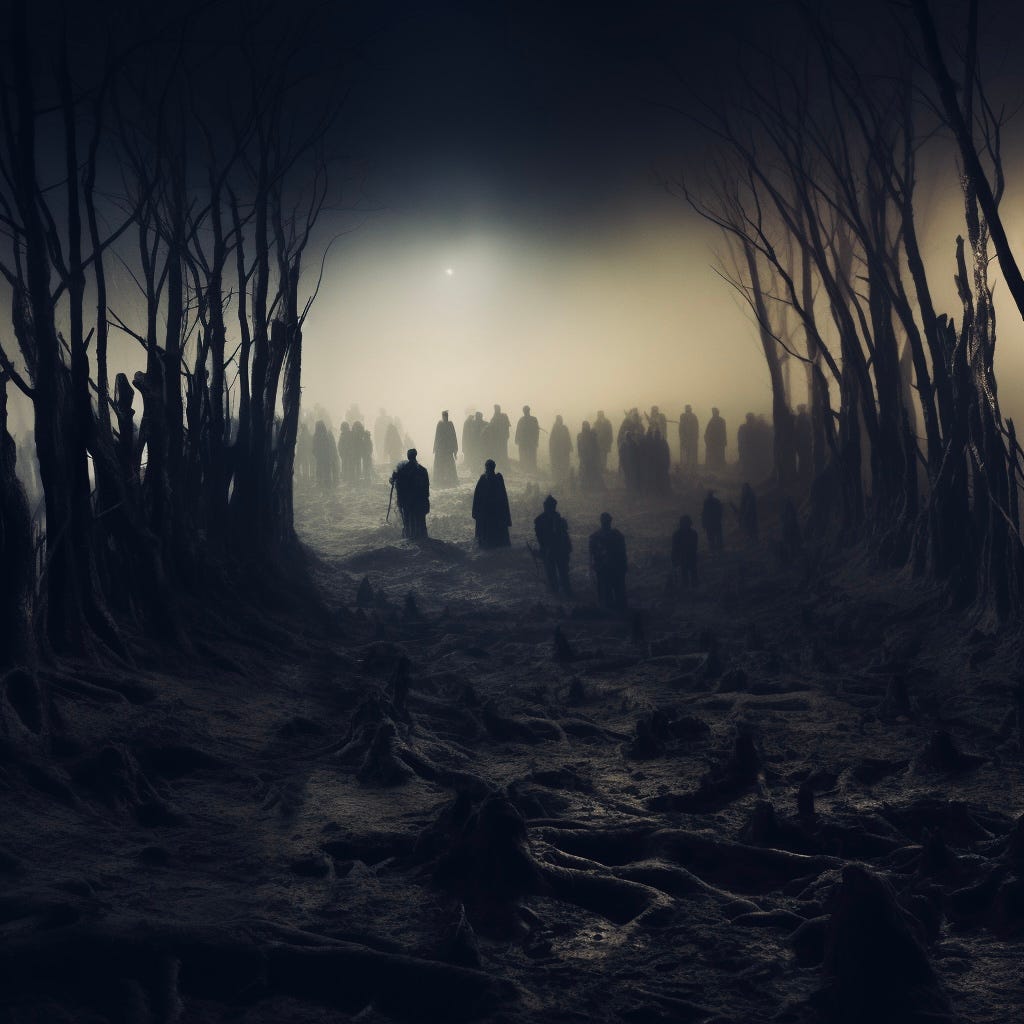
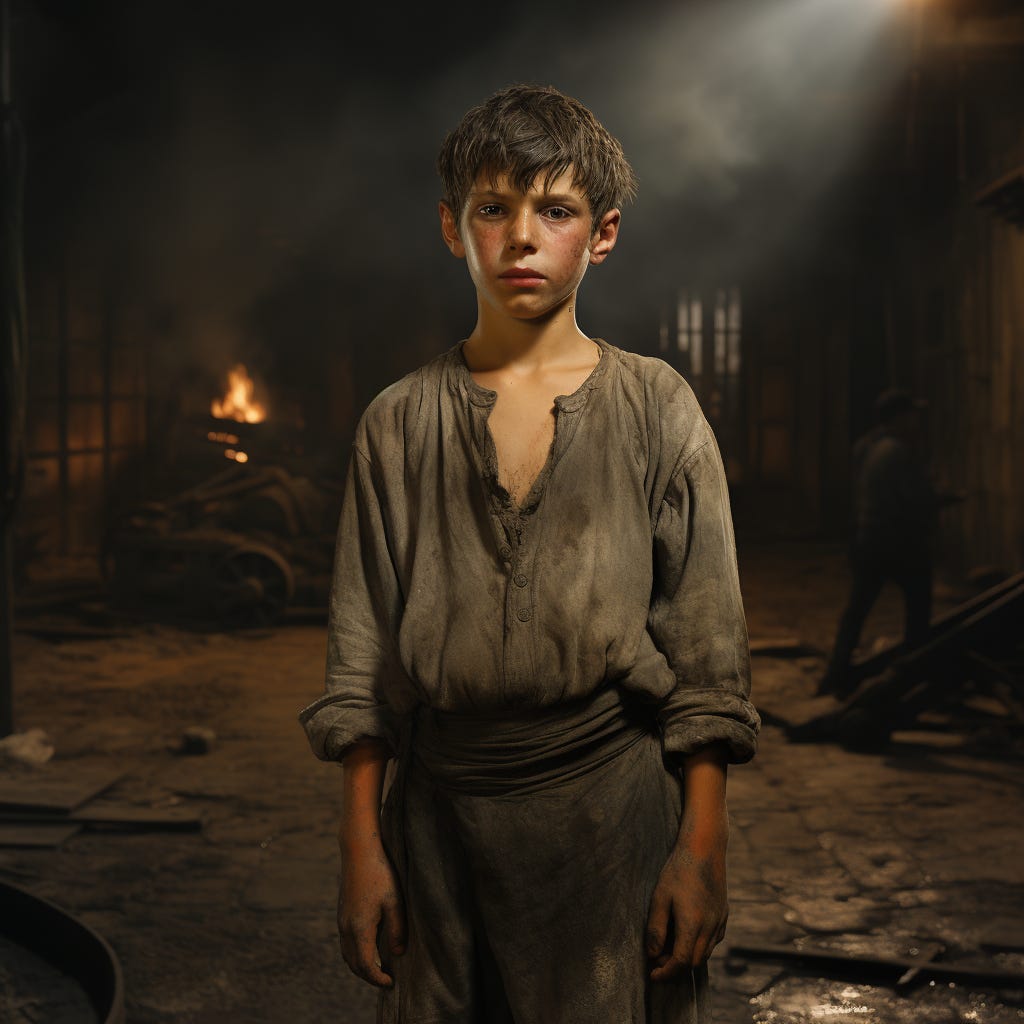


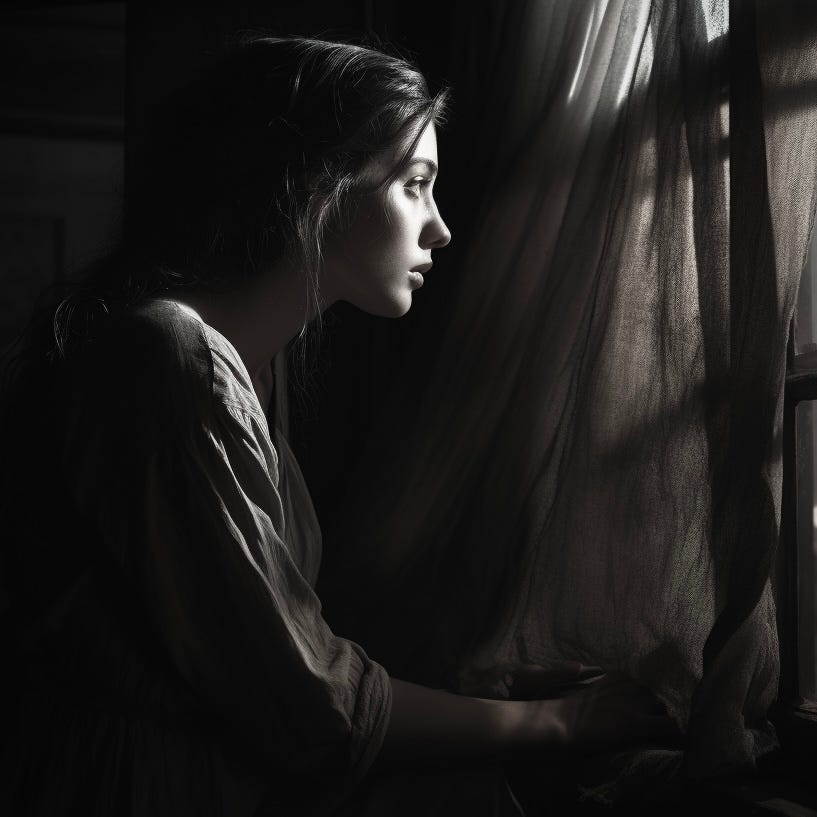
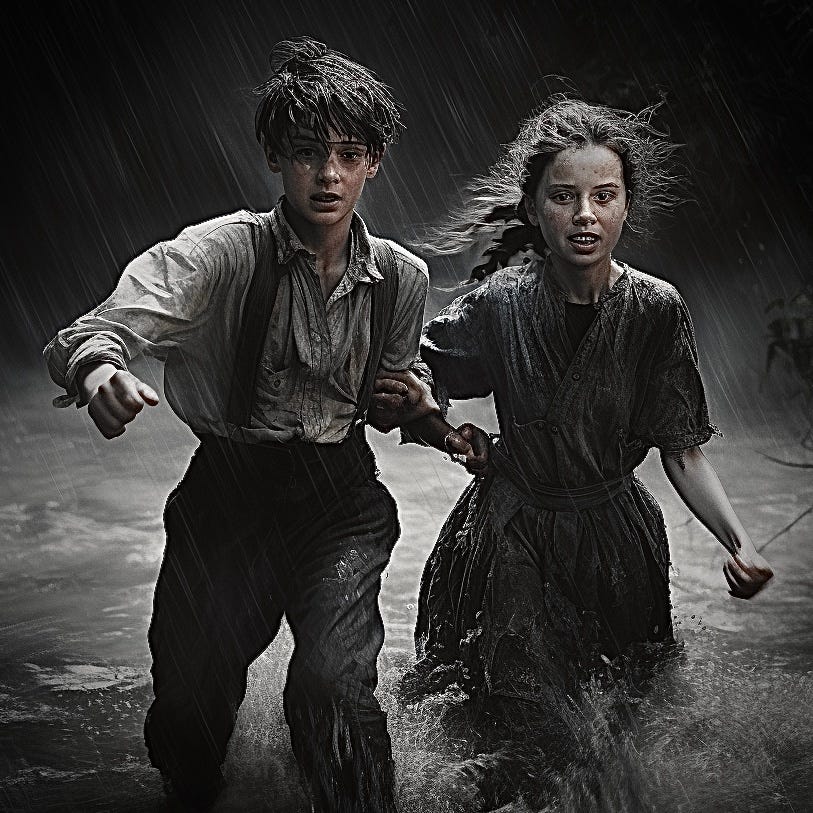

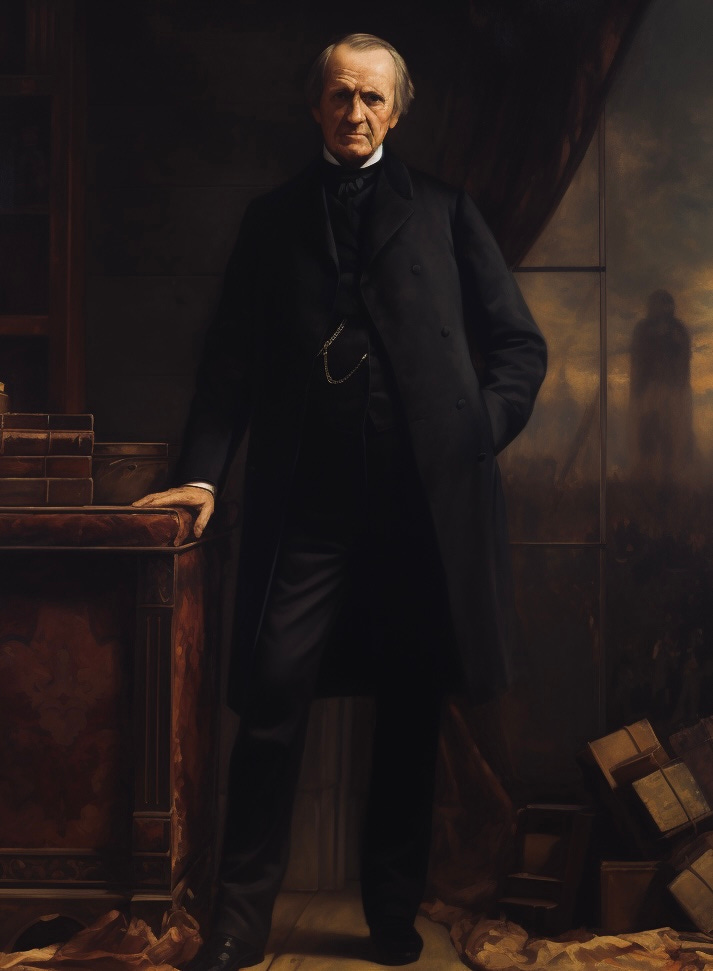
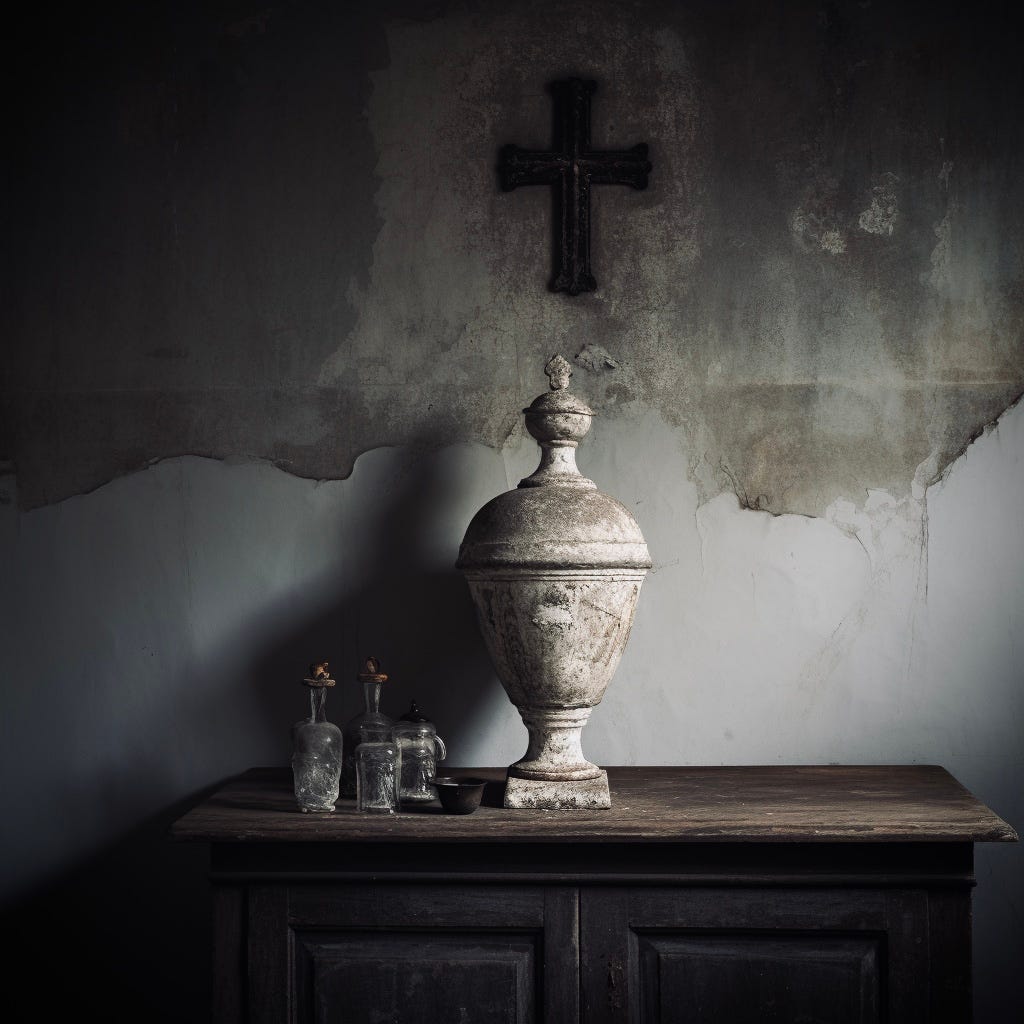

Spookier by the minute!
So much for the respite that Hermann and Henrietta have had here, with poor Nanna paying the price for helping them. Now it seems like Eva must be some kind of medium between the two worlds that seem to exist here now. Seems they are on an unavoidable path to the monster's vengeance. Such dispare that Hermann must feel at this point! I am enthralled Daniel!